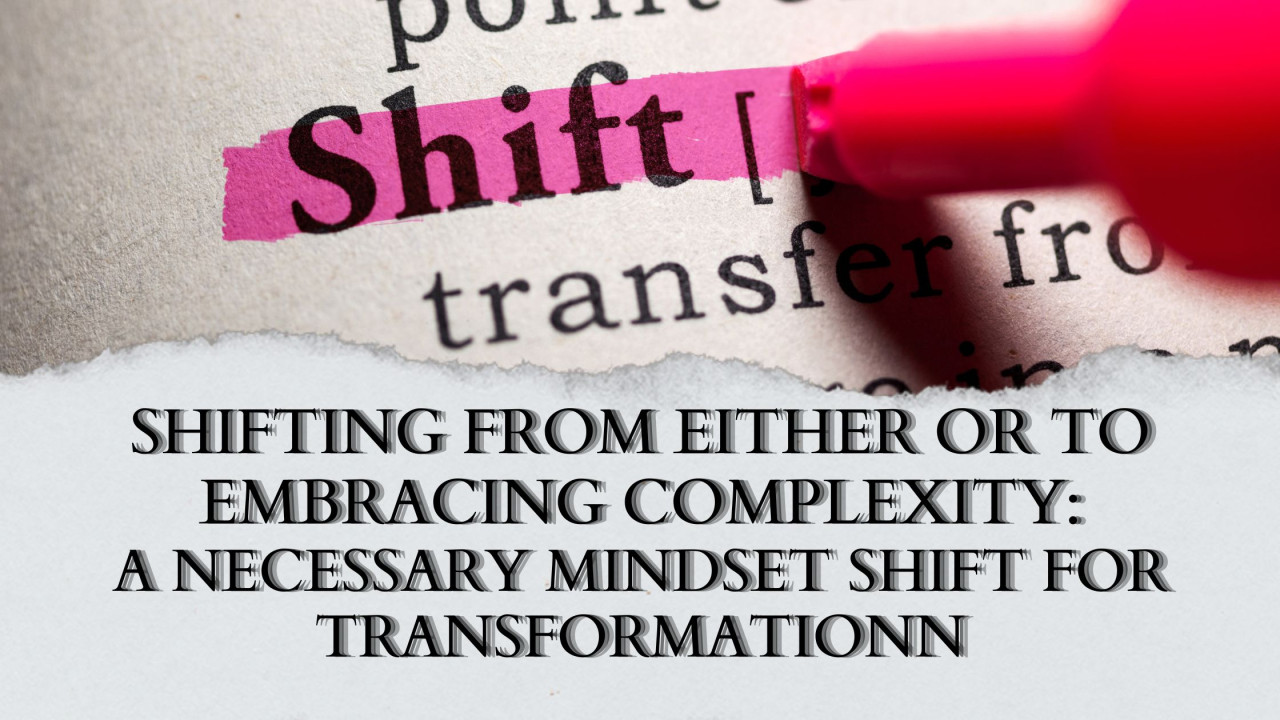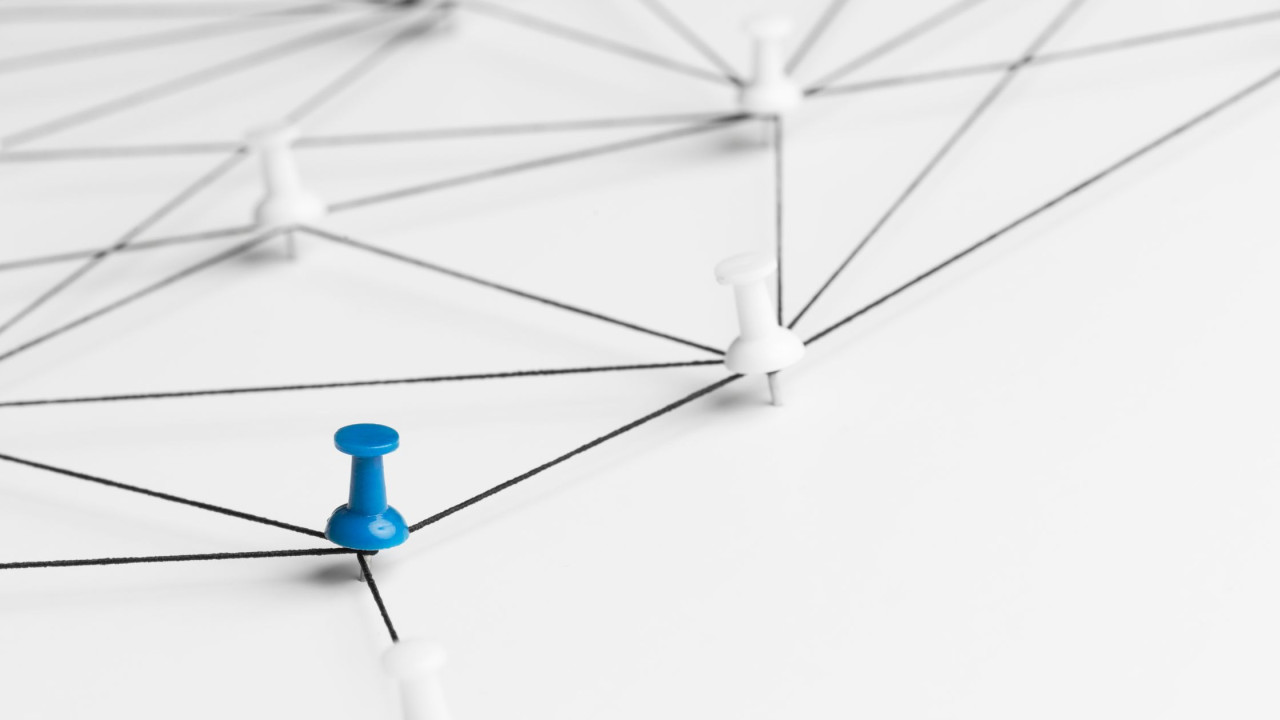(404) 793-0011 | drmaiysha@drmaiysha.com
Shifting from Either or to Embracing Complexity: A Necessary Mindset Shift for Transformation
Binary thinking, also known as black-and-white, dualistic and either/or thinking, refers to the tendency to perceive issues in a simplistic, all-or-nothing manner, with no middle ground or shades of gray. While binary thinking can be useful in certain situations, such as making quick decisions in emergencies, it can also have harmful consequences in various aspects of life. In a world that is filled with the complexity and contradictions of trauma, embracing "both/and" thinking provides powerful access to navigating the intricacies of our complex reality.
The Dangers with Binary ThinkingOversimplification and Inflexibility: Binary thinking oversimplifies complex issues by reducing them to two opposing options. It often leads to rigid and inflexible attitudes. In reality, many issues are multifaceted and require nuanced consideration. This oversimplification can lead to a distorted understanding of the complexities involved. The failure to recognize the complexities inside issues like race and oppression, learning and education and healthcare has (and continues) to cause harm to historically marginalized populations. When people take the position that one is either supporting completely or rejecting something entirely, it prevents nuanced discussions that can lead to better outcomes. Binary thinking ignores the nuances and subtleties that often exist in real-world situations. It fails to acknowledge the spectrum of possibilities between two extremes, neglecting the middle ground where compromise and alternative solutions may lie.
Polarization: Binary thinking also tends to polarize discussions and communities. It fosters an "us versus them" mentality, where individuals or groups are perceived as either completely right or completely wrong. This fosters an environment where individuals default to their judgmental attitudes and become quick to criticize or condemn others. The binary thinking in political polarization is a perfect example. We are seeing even today where issues are reduced to two extreme positions and "us versus them" positionality that hinders empathy and collaboration, resulting in social divisions, conflicts, and a breakdown of constructive dialogue.
Stigmatization: Binary thinking also contributes to the stigmatization of individuals or groups by oversimplifying complex issues and attaching negative labels. This can perpetuate stereotypes and discrimination. We can see examples of this is in the traditional education system. In education, binary thinking can manifest in rigid grading systems that categorize students as either successful or unsuccessful. Not only does this lead to stigmatization, but it also overlooks the diverse approaches to learning that can bring out unexpected talents and strengths that individual scholars possess.
Ultimately Failure to Recognize Complexity leads to closed-mindedness, making it challenging for individuals to consider alternative perspectives or entertain the idea that there might be multiple valid viewpoints. It is easy to see if you look in the world the complex challenges are already not adequately being addressed through binary solutions. While we may be advancing technically, as a society, this type of thinking is causing major harm, and stripping people of their empathy and humanity.
Moving from Either/Or to Embracing the All of It
Dialectical thinking goes beyond the limitations of binary perspectives, encouraging individuals to explore the dynamic interplay of contradictions and nuances. It explores the dynamic relationship between opposing ideas. Rather than viewing contradictions as unsolvable, dialectical thinking seeks to understand how contradictions can coexist, interact, give rise to new possibilities and solutions that transcends the initial opposing views.
By acknowledging the complexity of issues and embracing paradoxes, one can develop a more nuanced understanding of the world, fostering an open-minded approach to ideas and perspectives. Instead of immediately dismissing opposing views, individuals can engage in dialogue, recognizing that the willingness to be with contradictory ideas may lead to a more comprehensive understanding. In the end, this enhances the ability to adapt to changing circumstances, evolve, and find creative, adaptive solutions.
One of the most important things we can do to begin to move into embracing the and is to facilitate dialogue. When we connect with people, listen and be willing to entertain views and lived experiences other than our own, it enables us to empathize and see the humanity in each other. It enables us to see more commonalities while honoring the differences. By doing this one can find common the values and desires that lead to solutions that neither could have synthesized alone.
As we navigate the complexities of the modern world, it becomes increasingly evident that the limitations of binary thinking impede societal progress. By embracing complexity, allowing contradictions, and facilitating dialogue, we can break free from the constraints of oversimplification and rigidity, fostering a society that values nuance, dialogue, and co-liberation. The shift from either or thinking is not only a cognitive evolution but a societal imperative if we are to move forward effectively with the complex challenges that lie ahead in our world.
Need a speaker? Learn more about Dr. Maiysha's speaking, consulting, and training offerings. Bring the tools of trauma informed listening and speaking into your organization and create psychological safety for your leaders and staff. Increase productivity, employee satisfaction and retention. Contact us today and schedule a call with Dr. Maiysha to learn how we can improve your workplace culture. https://mindremappingacademy.com/corporate-programs
Stay Informed
When you subscribe to the blog, we will send you an e-mail when there are new updates on the site so you wouldn't miss them.





Comments